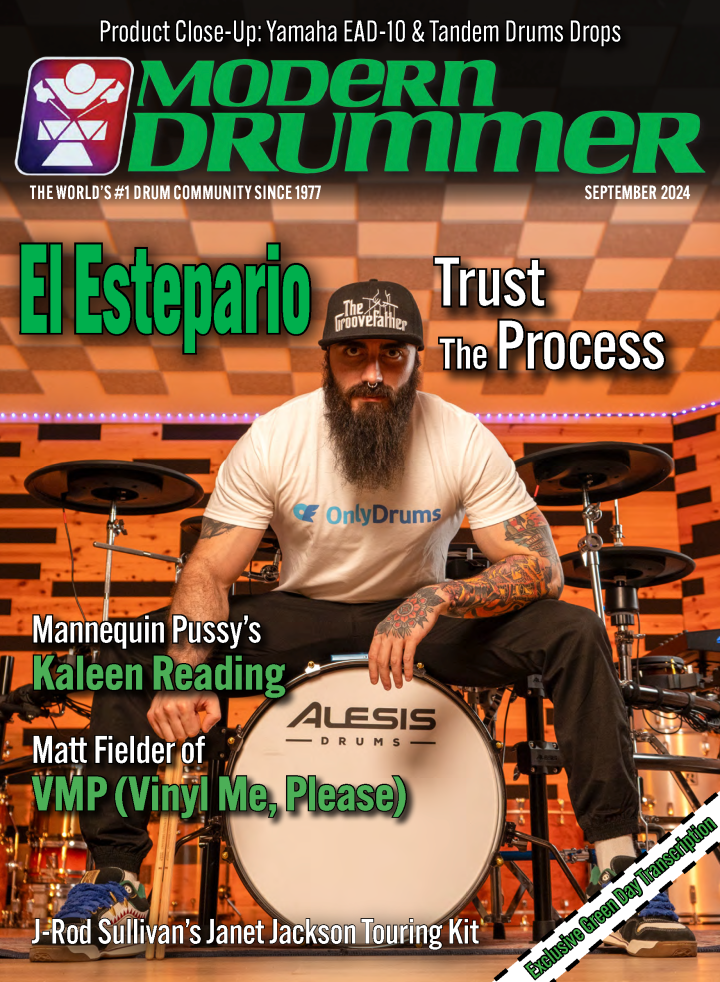EL ESTEPARIO
TRUST THE PROCESS

With over 5,000 online drumming video clips and millions of subscribers, Valencia, Spain’s El Estepario (Jorge Garrido) has become a worldwide drumming sensation. Today it seems like every drummer has been forwarded a video from a friend saying, “Check THIS guy out! He’s AMAZING!” El Estepario’s online drumming is simply jaw dropping, and he is influencing drummers everywhere. If you aren’t convinced, watch the video of him playing “Holy Wars” by Megadeth or his version of the Backstreet Boys tune “Everybody.” They are two of his favorites because they include (ironically) a few mistakes. In this interview, El Estepario’s humility and his passion for drumming and sharing information comes through loud and clear, but there is MUCH more to him than meets the eye and ear. He is now explaining some of his drumming vocabulary and learning processes on his Drumeo course, and there is more to come! We don’t hear El Estepario interviewed often, but he and I talked candidly for several hours, prepare to be very surprised!
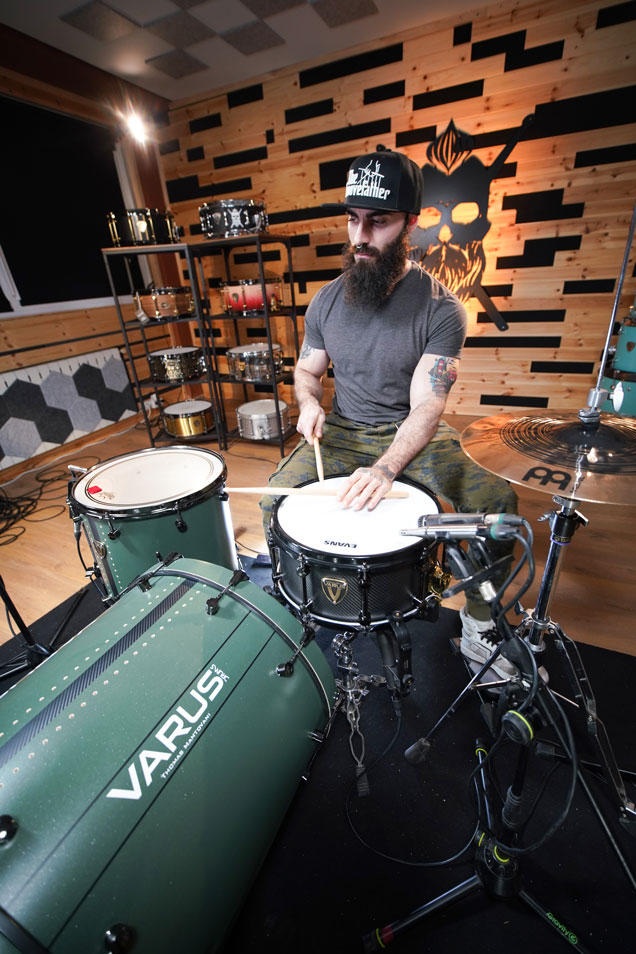
MD: How did you first start playing drums?
EE: That’s a great question. I started to play when I was 12 years old. I had a lot of energy, and I didn’t really know what to do with all that energy, but drums were the best solution to that. In the beginning, I wanted to play guitar and my older brother wanted to play drums, but at some point, that changed. I found a local teacher, and for five euros an hour I took lessons. My parents took me to this guy for an hour every Monday for a year before I had access to a real drum kit. It is absolutely necessary for a drummer to take lessons because it’s very hard to buy a drum kit and just start practicing or playing. The first thing you need to do is get with somebody that already has a drum kit and learn. As soon as I had a real drum kit of my own, I stopped taking lessons. There was nothing wrong with him as a teacher, but I wanted to explore the instrument by myself.
MD: What was your first drumset?
EE: My first set was a second-hand Ludwig Accent, I sold that to get a white Tama Imperialstar six-piece kit, I sold that to get a Mapex Saturn kit that I had for a long time, they were great drums.
MD: What kind of things were you studying with your first teacher?
EE: To be honest, he had a lot of passion and that’s what I liked about him. He started as a trombone player, and at 60 (or so) he realized that he wanted to play drums. He didn’t know much about drumming, but he had a strong musical background. Because of the trombone he could sight read and he knew a lot about music, but he didn’t know much about the drums, he had only been playing for four or five years when he met me. He really taught me about the passion that he had for the instrument, that’s where we really connected. Advertisement
He tried to teach me to read but I was not interested in that at all. He taught me how to hold the sticks, he taught me a lot of paradiddles and rudiments, and we did the whole Stick Control book. He explained singles, doubles, and fills… the basic stuff.
MD: After you stopped taking lessons, did you join a band?
EE: After I was practicing with him for a year, I could recognize the instruments on the set that were being played on recordings. If we’re honest, in drumming you usually already know (basically) what’s happening, you can use your ears to tell you what’s happening. Older drummers always talk about how hard it was to realize about what drummers were doing, but they didn’t have any visual help that we have today to understand what was going on. Once YouTube started to appear, you could watch performances and solos and see what was happening. Nowadays, anyone who has the desire has a way to learn. Maybe it was harder before, but now there is so much material out there. I just had a lot of passion to learn!
MD: That’s the one thing you can’t teach, passion.
EE: The songs that I wanted to play from Sum 41, Green Day, and even Slipknot were hard to play because of speed and endurance, but they were not really that complicated. It’s not hard independence stuff, it’s just regular drumming. You can listen to it, and you can play along. Maybe you are not as fast, but you can play around a little bit on top of the song, that’s what I did, and I did it as much as I could. But Iback to your question, don’t think I was ready for my first band; in fact I didn’t even want to join a band. Advertisement
MD: Why not?
EE: I come from a very small town, and in order to be in a band, I would have had to move my drum kit to a rehearsal space with the rest of the band. I only had one drum kit back in the day, and I hated the idea of moving my kit to a band practice space where I couldn’t practice drums. I just wanted to play on my own and I didn’t see the point in performing with a band. The first time I joined a band it was because they had a drum kit, and I didn’t have to move my drums into the rehearsal space. But even then, I never wanted to become a full-time drummer. I don’t even think I even want to do that today, it’s a terrifying idea and a very hard life, I think it would be an awful choice for me. So I concentrated on my studies, it was a hobby, no pretense whatsoever, I didn’t want to be a rock star!
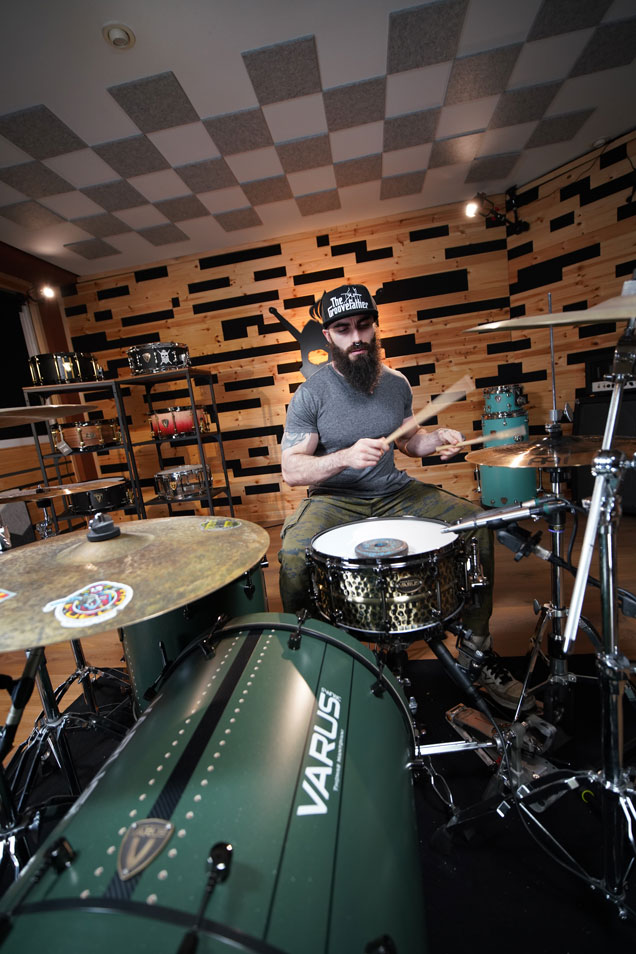
MD: How did your drumming progress from that point?
EE: My main drumming idols and influences start with the music of the 90s. I was very influenced by the nu-metal drummers back in the day like John Dolmayan from System of a Down and Joey Jordison from Slipknot. I was listening to the same music that all the young people were listening to. Later in life I listened to Snarky Puppy and Mark Guiliana and found out that drumming was way more complex than I thought it was in the beginning. I think that’s something that happens to a lot of people when they start playing the drums, they never dig a little deeper and find the more complex languages inside of the drumming community, and I think that is a big mistake. I found a drummer here in Spain named Miguel Lamas, he’s an amazing drummer that has a style similar to Thomas Pridgen. He plays a lot of paradiddle-based ideas, but he also has a pretty solid groove. I had the pleasure to play with him when I was 17 years old. That that was the first contact I had with somebody that I consider to be a real drummer. He was not only somebody that was playing mainstream music, but he had way more vocabulary and was able to play more complex things that came from jazz and jazz fusion. As soon as I met him my whole world changed. Miguel was a couple years older than me, and I had never seen anyone that young and from my own country playing stuff that I couldn’t even understand. I thought I knew how to play until I met him, and as soon as I met him, I realized that I had a lot to learn. He changed my whole career and inspired me to start practicing the way I should have been practicing from the start. I began to explore everything that there is to drums and drumming, my world exploded! I started paying attention to the people that everyone talks about like Vinnie Colaiuta and Thomas Lang. I heard them as the real drummers that play for the sake of drumming. I just wanted to explore how far I could take the drums, and I started to dig deeper into the whole drumming community.
MD: How did you hear about Miguel, and where did you hear his playing?
EE: We played a show together in Valencia, I was playing with my first band, and he was playing with one of the many projects that he had. He started talking to me and he was asking me to lend him my drum kit and cymbals for the show. He was asking a lot of questions that I considered to be “stupid,” they were questions that a guitar player would ask a drummer. After I saw him play, I thought he was kidding me, because he sounded like 1000 people playing the drums at the same time, since then he’s been an idol for me. Advertisement
MD: What band was Miguel playing in?
EE: He was playing with his solo project. It was a trio of an amazing guitar player, an amazing bass player, and an amazing drummer. That was his solo project, but he has recorded everything that has come out in the last 10 years with the top pop bands, but he still has a lot of projects and underground stuff where they just perform.
MD: Is he is he a popular drummer in Spain?
EE: Yes, he was the first drummer to break the national barrier and have success outside of Spain. For some reason, nobody from Spain has represented (endorsed) a brand like Pearl or Meinl. He was the first one to do that and that encouraged me. He told me, “If I can do it, maybe someone else can.” He proved it was possible, I just wanted to try, I didn’t think I was going to make it.
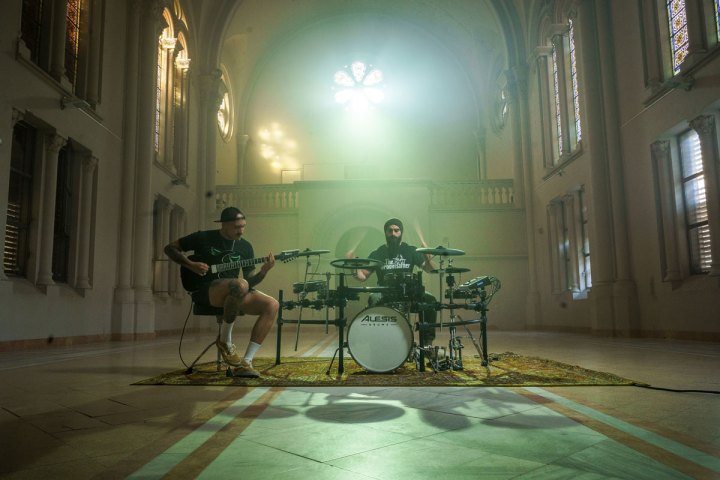
MD: At that point in your education, what type of drumming things were you downloading and watching on YouTube?
EE: I would just type “drum solo” and the best results would appear. Whatever appeared I would download it. That’s where I first saw Jojo Mayer and Thomas Lang, the drum solo from Thomas’ Creative Coordination and Creative Control videos were the first results that appeared when I typed in “drum solo.” That was actually a very good experience because I could witness thousands of drummers that I didn’t know. I was always interested in the drumming not the person behind the drumming, I didn’t care about the person, I would just watch drumming for the sake of drumming. Advertisement
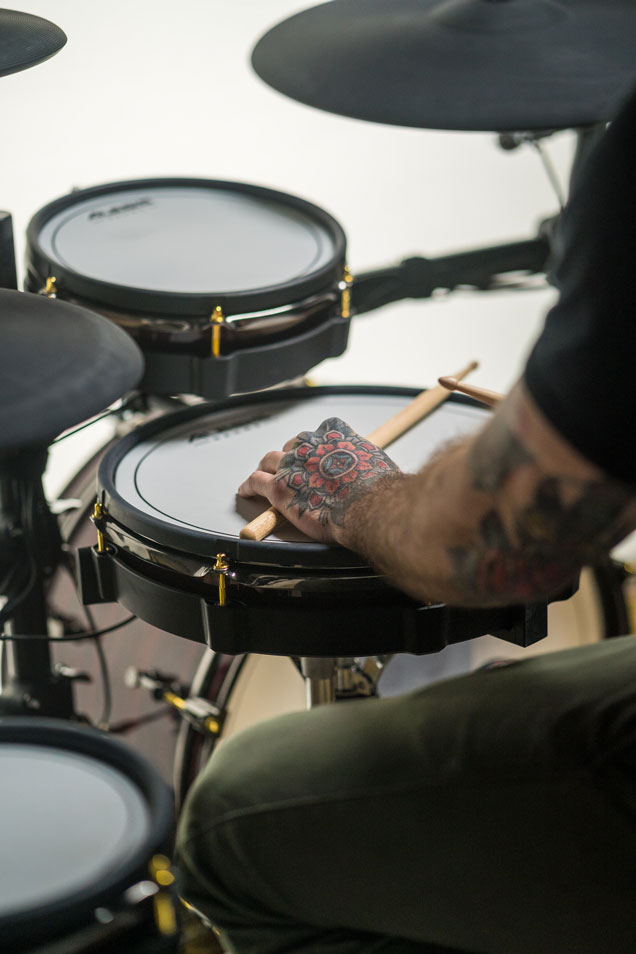
MD: You are a drummer that came up on “Internet Drumming” and “Drumming for the Sake of Drumming.”
EE: I don’t know if it’s going to be good in the long term because the interests of the typical internet audience are pretty stupid. Most of the time you need to do a lot of stupid things to get attention. Eventually you might find yourself drumming for a very big audience, but nowadays I’m drumming for a lot of non-drummers. That means I need to factor in a lot of stupid stuff that you wouldn’t have to do in a normal drumming situation. There is a need to look cool, that’s a problem. I need to shave every time I record. My shoes must be clean, my gear must be shiny, none of that makes sense. All of that is just poisoning the whole atmosphere. You need a beautiful kit; you need the most expensive cymbals… I find all of that to be very poisonous to society and the drumming community. It all started with Twitter, in order to get attention, you had to put a lot of information in very little space, you needed to butcher songs to get attention. On YouTube I can have more of balance. The things I do on Instagram are appealing to some people, but I wouldn’t recommend playing like that anywhere! I don’t know if that’s a good role model for drummers to look up to. I think it could be very counterproductive and very poisonous for people that have just started playing drums.
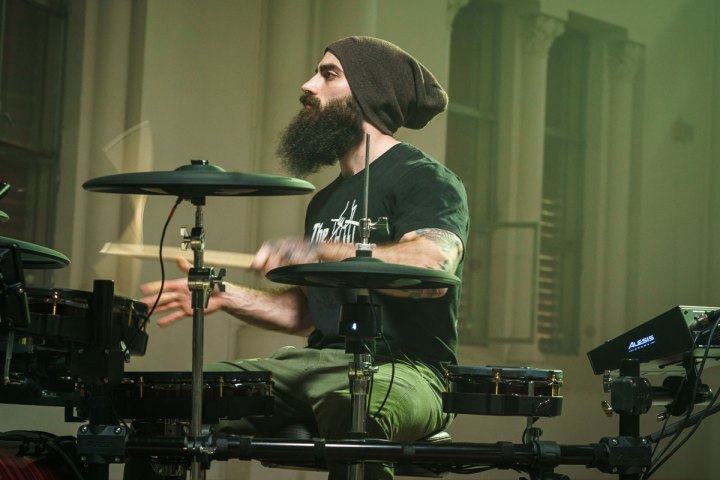
MD: I agree, there is a lot of drumming out there on the internet that has a lot to do with “drumming” but not much to do with “music.” But how did you come to realize that, because I think it takes a lot of young drummers a long time to come to that conclusion.
EE: Yes, it takes a lot of people their entire lives to realize that. What people need to understand is that my job is to get views. I’m not a drummer, I don’t consider myself to be a drummer. I think the most accurate term to describe what I do is “content creator.” That’s what I am. Content creators only care about one thing, views. In some cases, its money, but it’s all about views. To get more views, I study the analytics of my posts and I study the performance of my posts. I have been creating content for five or six years, and I have posted a lot of videos. In that time, you really get to know what people want to see and what people don’t want to see. I try to get the maximum number of views according to the statistics of the content that I post. That means that I’m working for the audience and not working for the music, and that is a very important distinction to make. I try to replicate (not only) the drumming skills, but the attitude, the clothes, the background, the camera, the lighting… Every single factor is important. But I think there’s a couple of problems in there. Most drummers don’t realize that, and they take you as a “drumming role model.” I am not trying to be a drumming role model, I’m just working to get big numbers, I’m not working for the music. It is shaping drumming in a way that shouldn’t happen, but it’s not just me, it’s everywhere! If I wasn’t doing it, other people would be doing it. I’m really sick of all the hate because social media is not all negative. Thousands of people pick up the drumsticks after watching my videos, and I don’t get any credit or money from that. For example, Joey Jordison was my role model, he is the reason why I picked up the sticks. He changed my life forever without even knowing it. I started to play drums and now I make a living playing drums because of him. I would say the most important thing about being a social media guy is the inspiration I provide. I just wish people would respect what I do because it’s just work and it’s free. That’s all I ask for. No one is paying to see anything. Advertisement
MD: I’m not going to ask you to give away any social media secrets, but what do people want to see on social media?
EE: I can give away secrets, I don’t care… I encourage people to start doing what I do, but it takes so much work that I’m pretty sure most people would just quit. I could talk about thousands of key factors. Smiling is good, smiling makes it look like whatever you’re doing, you are doing it effortlessly. That’s one of the biggest comments that I get it, “It always looks like you could do more.” I took that from the book The 48 Laws of Power and applied it to my content. The book says that you need to look as if you can always do more. I also see a lot of content creators that share their personal problems on the platform, I would never do that. I don’t talk about depression on my platform even when I have been depressed. I don’t talk about personal financial struggles even when I’ve had them. On my profile I try to look invincible, that is very important. My content needs to look good, fresh, and happy. I don’t talk about politics (why would I?) I think that’s good advice to start. I always try to look happy, share happiness, and never look like I have any problems. That can be distressing as well because it shows the downside of social media and how fake everything is.
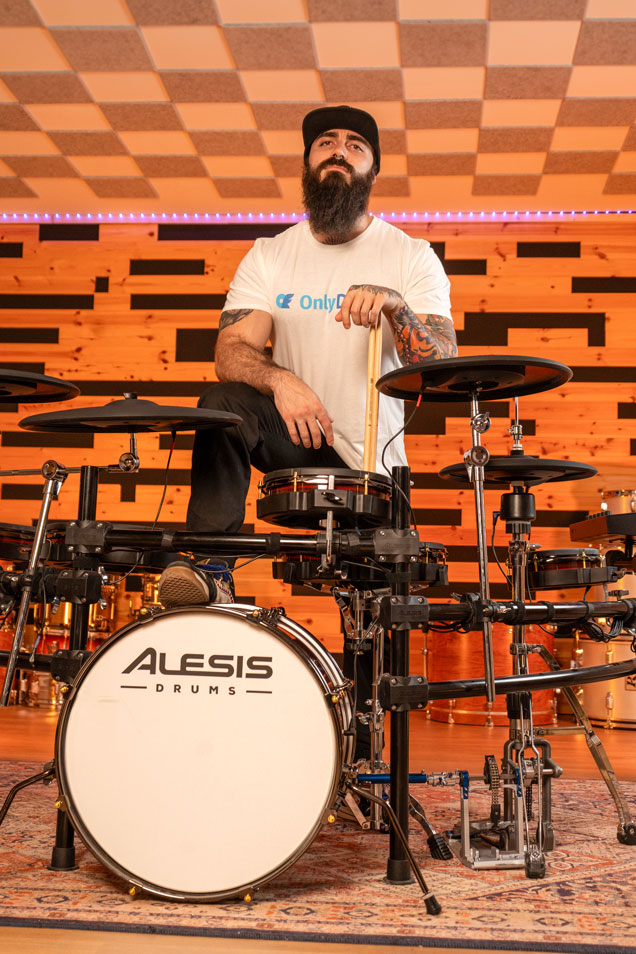
MD: How did you develop your social media presentation, who did you try to emulate?
EE: It’s going to sound ridiculous, but I think the most I’ve learned about creating content for the internet has been from the Adult Film Industry. They have a goal in mind, and they want to sell you the product. They get your attention, and they smile at the camera. I have a friend in that industry, and I learned a lot from her. We are talking about analytics and statistics; she is the person I learned the most from about posting content. I learned a lot from those people, they have a skill, they smile, and they try to give good vibes and appeal to as many people as possible. Ultimately their goal is to sell you something, their social media channels are just the tools that they need to have an amazing and big reach. They need to be very appealing to a lot of people. I was able to look at it not from a sexual way but just from a statistically, intellectual, and interesting point of view. Those people are brilliant, you can like it, or you can dislike it— But the way they sell things and the amount of money that they make is not something that you can underestimate, they are not stupid people. I’m telling you if you want to learn from somebody on how to post content and make money, look at the people in the Adult Film Industry.
MD: Explain to me how you went from downloading drumming videos from the internet to how you are playing drums today, explain that process?
EE: With the things that I can understand (but can’t play) I always recommend looping things. I would rather listen to something 10,000 times looped at full speed, than listen to it a couple times at a very slow speed. With things that are more complicated, if there are a bunch of ghost notes that you don’t understand maybe you need to slow it down to see what is going on. Today I try to loop things, back in the day I don’t think there were many things that I needed to slow down. Once again, we can go back to Joey Jordison. You can listen to a Slipknot song and there’s a bass drum pattern going very fast. Your brain can understand it, you just cannot play it, but you understand what’s going on. I always like to make a difference between complicated and complex. There are complicated things that you understand but you cannot play. And there are complex things that you cannot play because you cannot understand them. For example, “Bleed” from Meshuggah has that herta pattern going on, and maybe you cannot play it, but you can understand it. Snarky Puppy might be something that you cannot play because you don’t understand what’s going on because it’s constantly changing. I think those are two different types of art that you need to approach with two different strategies. Advertisement
MD: I always tell students that we are constantly dealing with two different challenges. If the student can’t understand something, then it’s my responsibility to help them understand what it is and help them find and travel the road to absorb what they can’t understand. If the student fully understands what something is, but they can’t play it yet, it is the teacher’s job to reinforce their understanding, and assist in travelling the path. But in that scenario, the responsibility lies upon the student to put in the time to absorb (practice) whatever it is they want to learn. Is that what you mean by the complicated vs. the complex?
EE: Yes, that is the same thing. Students and teachers both must take responsibility for their parts in the learning process. The distinction that you explained makes total sense. At a certain point the responsibility falls upon the student, not the teacher. In today’s world, that has gotten a little flipped around. A lot of people are struggling with their instruments (or whatever endeavor we are talking about,) I don’t think they understand how much responsibility or potential they have— if they would just apply enough time on their craft (whatever craft that is.) That is definitely an issue nowadays. I think George Orwell said that there would be a time where there’s so much information available that the governments are not even going to try to hide it, they’re just going to allow the information to be free and available, because so much information is eventually going to kill the will of people, I think that’s where we are right now. For example, you can learn everything about drums online, however I don’t see a translation between the amount of information available, and the number of amazing drummers out there.
MD: When you are looping things to learn, how long are the loops?
EE: They can be long or short loops, but I work with them for a long time. I like to loop odd-time signatures, it is a very good practice tool. I recommend “Skip Step” by Nate Smith which is in 17 / 16. It’s nice to have a couple loops in every time signature. For 5 / 4 I use “Mission Impossible” and “Take Five.” “15 Steps” by Radiohead also works for five. When you need to improvise or play in those time signatures you must have something in your head that you find familiar. Advertisement
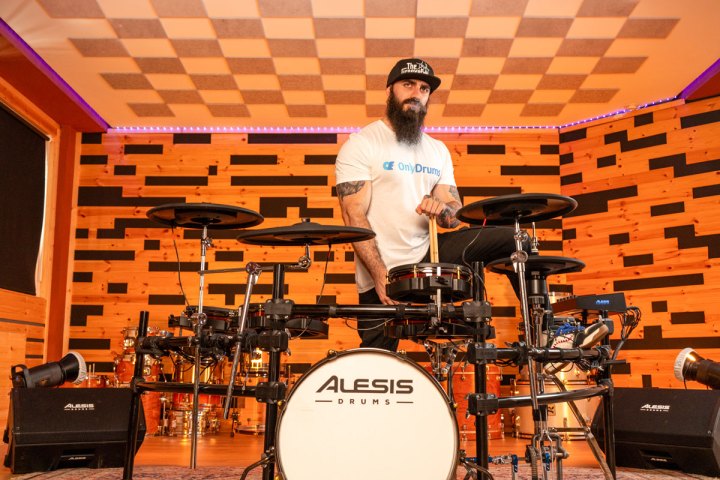
MD: Do you count them out?
EE: I don’t really use my voice much. Most people try to count when they’re playing odd time signatures, I just go straight to the hardware that we all have (your brain) that I have already programmed with those odd-time loops.
MD: What else did you do on the drums, before you became an online content creating sensation?
EE: From when I started drumming at 12 until I was 19, I was very dedicated, I practiced one or two hours every day, but drumming was just a hobby. As I told you, I never wanted to become a professional drummer, but I was dedicated. I think that dedication came from watching my parents work, even today they are workaholics, they work for 10 to 12 hours every day. That has stuck with me. But they didn’t explain that philosophy to me, I just saw it as an example. The best way to teach your kids is by example, not with words.
But then, after I dropped out of university, I realized that if I wanted to pursue a career as a drummer, I really had to raise the bar. I had to practice much more. I didn’t have a job so all I did for the whole day was practice and play drums. I made sure I had the proper nutrition and proper rest which are two very important factors if you’re going to practice a lot. I would play for four hours in the morning, rest for an hour and a half, so when my brain started again, I could practice for four more hours. I did that for four solid years, that was the philosophy that I had back in the day. It was practicing for the sake of practicing and once you start practicing it doesn’t even matter what you’re practicing because (as they say) even a broken clock is right twice a day. If you have an office job, you go to the office for eight hours a day. I don’t understand people that want to be musicians, but they don’t practice, it makes zero sense to me. Look around you, everybody around you is spending eight hours a day working on their craft. At some point you need to practice eight hours a day, that’s what you do to become better than the rest of people, it’s just basic math. Advertisement
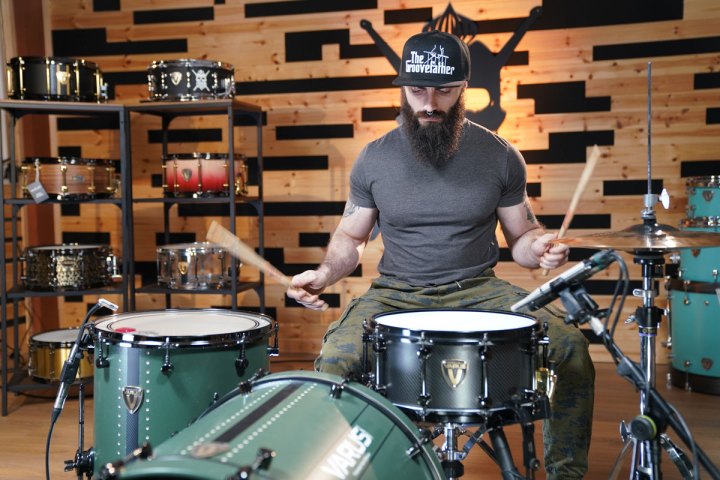
MD: What did you practice?
EE: I was not a responsible drummer in terms of practice, I know a lot of people have practice books and practice routines, I didn’t. I used YouTube, Instagram, and whatever I saw that I liked, I just practiced it. People always ask me what they should practice because they are out of ideas. I ask them, “Can you play everything? No? Then it’s not very hard to figure out.” If you want to play double bass at 300 BPM, you can start at 100 BPM and build it up. It’s the same thing with your hands, and it’s the same thing with everything.
I think that has affected my drumming in both good and bad ways. The good way was that I feel like I gained a lot of skill in very little time. The bad way is that I find my drumming to be very robotic. My drumming evolution was something that I forced into my brain. I think anyone with a couple eyes and good taste can see that when I’m drumming. I lack a lot of subtle details that can make everything sound very different. A proper drummer that has been practicing properly for two decades has learned about those subtle details, I totally get that, and I’m sure you can see it too. But most of the internet audience cannot, they just don’t have that level of appreciation. But anyone that knows about drumming can see and hear that, it’s not a secret.
MD: When you were seeing things online, and trying to replicate (or learn) them, what was hard?
EE: For a couple years I tried to play a solo that Miguel Lamas played on the Tam Tam Music Festival. He uploaded this beautiful solo, and I just tried to replicate everything he did in that solo. I remember having a lot of problems with the foot samba pattern while playing groups of three notes with the right hand on the ride with two notes on the body and one on the bell. Advertisement
MD: 1 e and, or 1 and a?
EE: He did both and at a crazy speed that no human should be able to play. I would just start the metronome and practice that pattern again and again while trying different syncopations with the left hand. That’s something that I did for probably two years, two hours a day. I must say that I did eventually realize that after 3 1/2 hours the human brain cannot keep learning, so I put the TV in front of me and I watched TV while I practiced the most mechanical movements like finger technique and double bass. I would just watch the TV and try to play with the metronome for hours. I don’t think it’s healthy for your brain to practice eight hours a day.
MD: It’s interesting, I have a whole process that I call “TV Practice” too. When you can get to the point where you’re watching TV and your hands are working they are supposed to do mechanically, you’ve achieved a certain point of unconscious muscle memory. I have also read that when we are learning something right before we sleep, our brains keep processing it while we sleep. So by getting some sleep halfway through your practice routine your brain was still practicing and processing.
EE: I’ve read that too.

MD: What else did you practice?
EE: I have always been very interested in coordination. Coordination can give your playing personality very quickly. It’s probably the thing that most drummers never practice. Everyone worries about the basic stuff, speed, dynamics, etc. But coordination allows you to play things that nobody on planet earth can play. You could even sit down with (for example) Chris Coleman and play a complex pattern, and even Chris Coleman is going to have some trouble until he has practiced it for a long time. I have practiced independence and coordination for a long time, lately I’ve been doing some crazy things that have taken a lot of time. But I should also say that back in the day I was already interested in practicing different weird patterns with several pedals. To develop independence and coordination, the most important thing was that I was developing a system. Sometimes when people ask about practice, they ask for specific exercises. But for me it has never been about exercises, it’s about the way you approach drumming and developing a system. Let’s say for example, you’re playing a clave’ with your left foot and a bass drum pattern with your right. I always try to switch the clave’ to the right and the bass to the left foot. I did this with the hands too. We have four limbs, and you can switch the different patterns of a beat between the four limbs. Just by doing that with one very simple groove, you already have years of practice. Developing that system and exchanging the roles of the hands and feet is a very interesting way of approaching drumming. It offers thousands of exercises and ways to approach things that you already know. Advertisement
MD: You have fast feet, how do you set up your pedals?
EE: Drums are very tricky for a very simple reason; we must deal with something that is placed between us and the instrument. With the hands we have the sticks, and with the feet we have the pedals. A pedal that is set up to play very fast, and I’m talking about 240 BPM, is probably not going to work very well for very slow tempos. I have found that most of the drummers that can play ridiculously fast have a lot of trouble playing very slow because they are using different muscle groups. If you are using double strokes with a heel-toe or the swivel technique to play very fast with your feet, you are using very small muscles.

MD: Are you are talking about the fast twitch muscles vs. slow twitch muscle groups?
EE: Yes. Therefore, whenever you need to play at 120 it’s difficult because the bass drum pedal springs are tensioned to the max and the beaters are super close to the drumhead. Those same drummers have a lot of trouble playing slower grooves. Coordination works the same way. You can spend years learning how to play polyrhythms of seven against five against three against four. But that doesn’t mean you’re going to be able to play clave’ over a songo pattern. Every aspect of drumming has a lot of interesting things going on, and that’s why good drummers value all kinds of drumming and drummers. If someone who is not a drummer sees Nate Smith play a groove, they are not going to understand why drummers appreciate Nate Smith because they don’t play drums. They don’t have the knowledge to appreciate the beauty of the things that he’s doing. Nate Smith is somebody who holds the pocket at very slow tempos and adds a lot of different musical details. There’s as much value in that as there is in someone playing blast beats at 280 BPM. But people cannot understand that until they learn the vocabulary. Drumming and music are a language, and you need to learn how to appreciate all the different aspects of drumming to appreciate everything that different drummers are saying.
MD: Do you personally have any difficulty playing slow or fast?
EE: I try to keep things in the middle, because today I need to be playing 80s music and tomorrow I need to play the next Slipknot hit, so I need to be very balanced and in the middle. But that can be a good tool or a bad tool because I’m not a specialized drummer. I am not a brilliant drummer in any style, but I can play a lot of things that can appeal to a lot of people. What we (as drummers) need to work on depends on our surroundings, why do you want to work, and what is your work? We all must find that balance. Advertisement
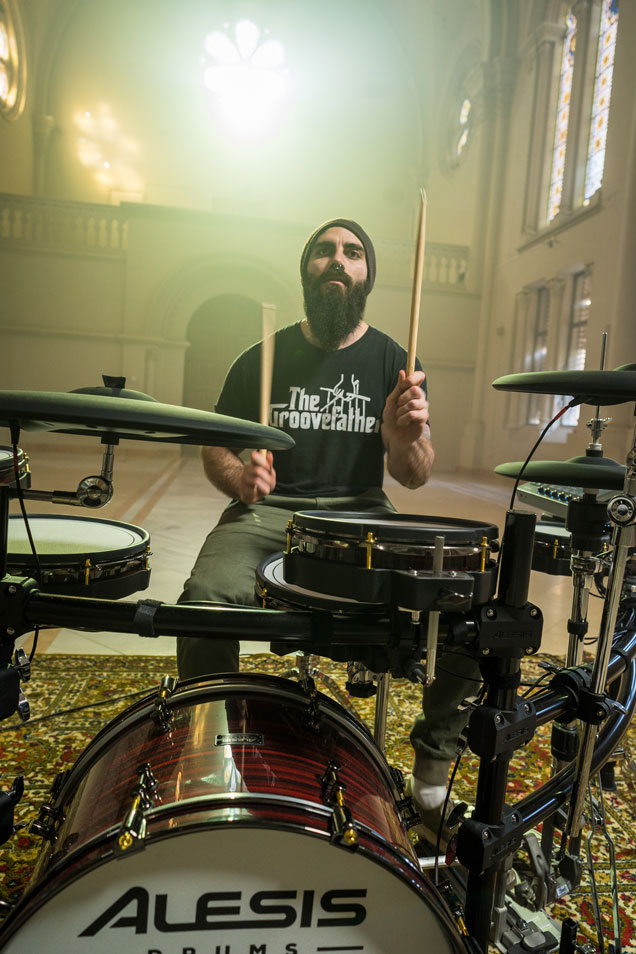
MD: I know this is a tough question to answer, but are you naturally a reasonably smart person?
EE: I have always said that I like putting effort into things, and I rely on that more that the more than the predisposition of being smart. I don’t consider myself a smart person because I work very hard to get better at things. In terms of intellectual things like university, I was pretty good, but I studied a lot. When I was in university studying political science and sociology, I studied most of the time, and when I was not studying, I was drumming. I would say I am very disciplined and a hard worker, but I don’t know how intelligent I am.
MD: Today, do you have any aspirations of joining a band and playing music?
EE: Yes, I am starting my own project right now. We hope to be touring by next year, but we only have three songs written and recorded, and to be honest I don’t think we’re going to be a massive deal. I am going to keep going with my drumming channel, that’s what puts food on the table. Of course, I want to try making music, but just for the sake of making music. I don’t want to create a band hoping to be the next big thing. It will be the opposite for me, my band is not looking for attention from the outside world, but I do think that my band is going to be good for my heart.
MD: Living in Spain, how influenced have you been by Spanish music, be it traditional Spanish music or Spanish rock or pop?
EE: I don’t think that any Spanish music has influenced me at all. I’ve never liked the popular Spanish music and bands, I think there are a lot of great Spanish drummers that have influenced me, but it’s never because of the music that they play to make a living. Those drummers are good studio and session musicians, but I’m interested in their performances outside of their respective bands. I like what they do at drum festivals and the things they play on their solo projects. I don’t think Spain has created much amazing music, today it’s all party-beach music and reggaeton. Advertisement
MD: What other interests do you have outside of drumming?
EE: I like to be at home enjoying my life. I never have enough time to take care of things, so now on the weekends I do laundry, cook something beautiful, and enjoy the little things that most of the people don’t pay attention to. I like to clean my house, I like to work in my garden, and I love spending time with my dogs.
MD: What drummers today are you listening to and inspired by?
EE: That’s a very good question, I don’t really pay attention to the drummers on social media. The only drummer that came out of social media that I really care about is Greyson Nekrutman, he’s a good friend of mine. Nowadays, I find myself going back to the drummers that first caught my attention: Chris Coleman, Eric Moore, Thomas Pridgen, David Coleman… I love that little kid that plays like crazy, JD Beck, he’s awesome. Mike Mitchell was JD Beck’s teacher and Mike is an amazing drummer that doesn’t get enough recognition. There are so many drummers that are doing interesting things, Larnell Lewis is a terrific drummer and an awesome guy as well. Benny Greb, Anika Niles… there’s so many of them.
MD: The drum world is a close-knit community and that’s a special thing. Musicians that play other instruments don’t have what we have. Drummers look out for each other, help each other, teach each other, and hang out together. Have you experienced that? Advertisement
EE: I’ve been asked this question a couple times. Unfortunately, I haven’t really experienced that because I don’t really go out as much as I should, and when I go out (again) I’m in Spain. People say that I should go to the States and keep building my career, but I like it here. I have my family here, my car, my dogs, and the good weather. I’m very chill. When I go out people don’t recognize me, there is not as much of a drum community here as there is in the States. I only experience the drum community online, and apart from a couple of bad experiences, most of the people are amazing and awesome to me.
MD: What gear are you playing?
EE: I just started playing Alesis electronic drums, I just got the brand-new Alesis Strata Prime kit, and I love them.
MD: Are there any issues with the Strata Prime kit tracking, considering how hard and fast that you play?
EE: None.
MD: After all those earlier kits, what acoustic drums are you playing today?
EE: I have been playing my custom Varus drums that are made in Valencia, Spain. My favorite Varus snare drum is a 6.5 x 14 cast brass drum. Varus has provided me with more sizes and more drums than I will ever need. My cymbals and sticks are Meinl, I love their German way of organizing things. I use 20” crashes, 22” rides, 20” China’s, and 16” Hi-hats. I change the models that I use all the time because I love them all, but my favorite ride cymbal is a 22” Symmetry ride, that’s the best ride I’ve ever played. I focus on pedals and thrones because those things come between us and the drums. I use a Pearl tractor style throne, and Yamaha FP 9 pedals set to medium tension.
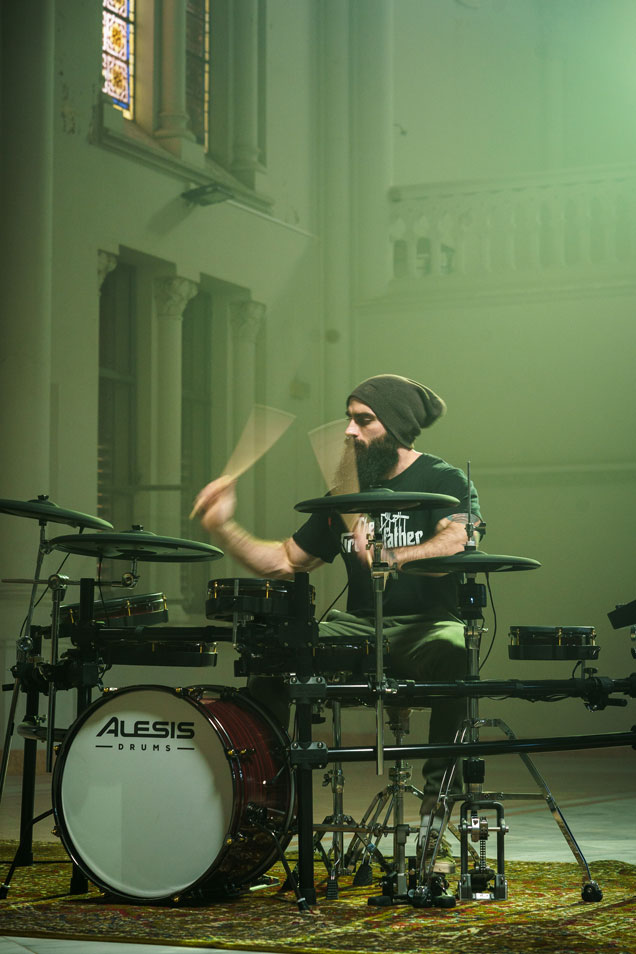
MD: What music are you listening to today?
EE: This might be a disappointing answer, but I barely listen to music. I have so much work that when I’m away from the kit, I don’t even listen to music. I used to love listening to music when I was training, cleaning, or whatever. But nowadays, whenever I listen to music it’s mostly music without drums. I’ve fallen in love with electronic music, whenever there’s a bass drum going at 120, my mind disconnects, and it makes the whole day easier for me. I play so much music and it’s always the same three songs, I have played “Toxicity” hundreds of times. I’m so tired of that music that I don’t listen to much music. I know that is a disappointing answer. Advertisement
MD: No, sometimes we need to give our brains a rest. Especially today when we are constantly bombarded with information and content 24-7. It is nice to give our ears and brains a rest, I get that. What are you working on drum-wise? What can’t you do, that you would like to learn or get better at?
EE: That’s interesting because to be honest, I’m trying (a little bit) to step away from the drums. I have 4 million people subscribed to my channel, and I’m not making nearly as much money as I should be making. If I was not playing copyrighted music, I would have been a millionaire a long time ago, but that hasn’t happened because the music that I play has a copyright. So all that money has gone to whomever. Now I’m trying to focus on building a different business model and I’m starting to shoot interviews. I’m doing interviews with people that I respect and admire. That will be content that I can monetize, that’s important.
MD: If you aren’t making that much money from your content creation, how are you making a living?
EE: I used to play in a cover band called Orquestra Monte’ Carlo here in Spain. It was a cover band that played a lot of different songs, we had a four hour show with all different kinds of repertoire. We played all over Spain. Spain is a country where there’s always party and there is a massive market for those bands, there are thousands of them. Maybe it’s the same in the States. You can make a living, or at least you used to be able to, performing with those bands. I did that for four years and I never spent any money. I’m also a very cheap guy, I save all the money that I make. I saved €60,000 while playing in that band. Spain is way cheaper than the States, you can live comfortably on €1000 a month. After I left that band, I started my side hustles, but they weren’t a big success. I started up a Drum Academy on Patreon and I started making a little bit of money on YouTube because at the time they had a different policy and you only gave away 50% of the revenue that they produced. I was also giving drum lessons by a webcam, and I performed on Twitch… As soon as you start walking that path different opportunities appear, if you have your eyes open. I don’t have a massive income source, but I have a lot of different things that allow me to make a living. Advertisement
In terms of improving my own drumming, I’m trying to get better with a double pedal, but I don’t know if that’s a good idea. With a double pedal you forget about a whole important aspect of drumming. I haven’t played a groove with a hi-hat in months. I’m just trying to get faster because it seems like there is a barrier that I’ve never been able to overcome, I have tried to get better at that, but I feel like I’m sacrificing way too much, so I don’t know if I’m going to continue with that routine. But that’s what I am working right now.
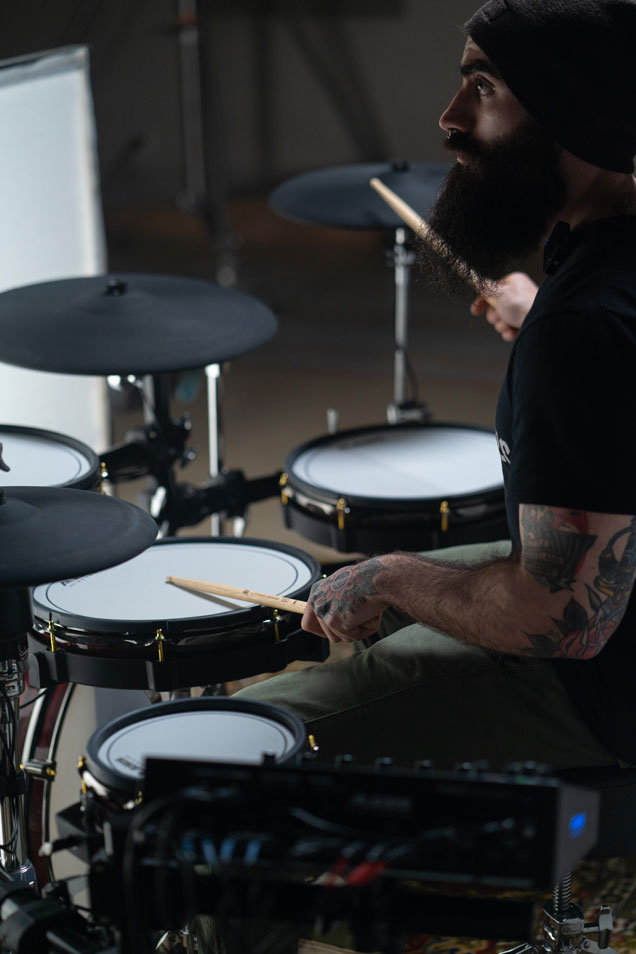
MD: What are your drumming strengths?
EE: Maybe I’m wrong, but I would say my biggest strength is to be able to replicate or emulate things that have already been composed at the drums. I’ve been doing this for so long that it isn’t a big deal for me to listen to something and be ready to play it and record it very quickly. That’s what makes me be able to put out so much content. I’m very good at that. I don’t specialize in anything, I like playing everything which has made my drumming stay towards the center of the spectrum, but I can play many different things that people like.
MD: Do you ever practice improvising?
EE: I do that a lot, especially to warm up. I just start playing whatever comes to my mind and I do that for at least 40 minutes every single day. It’s good to try to come up with different ideas.
MD: What is your daily practice routine?
EE: I warm up with improvising, then I work on some finger technique with triplets between 160 and 190 BPM. With the bass drum I try to play sixteenth notes nonstop between 160 to 200 for 10 minutes every day focusing on control and speed. I also try to play alternate singles with my hands for 10 minutes between 160 and 200 BPM. I do some rolling with my wrists too. The rest of the time is basically practicing chops and stickings. I don’t really practice grooves at all, but I want to have the technique to play whatever grooves I need to play, but I don’t play with the subtle details that everyone develops over time. Advertisement
MD: What stickings do you like and favor in your playing?
EE: What a great question! I’m in love with four stickings. Paradiddles, inverted paradiddles, paradiddle-diddles, and six-stroke rolls. I try to practice all the different permutations of those stickings to produce 10,000 different stickings. That is another way of studying. Sometimes you have a sticking, but that sticking is going to change depending on many notes you play. You can start any sticking from different points within the beat, that’s something that nobody does. With a paradiddle you have the four (or eight) different places that you can start it without changing the accents. If you change the accents there are thousands of possibilities of just that one sticking. I try to work on those four while also practicing the different permutations by starting on a different point in the beat. You can also change the doubles or the singles to a kick and see how that sounds, and if it sounds good, you can add that to the to the list too.
MD: The possibilities are endless! What is your favorite to play of those four?
EE: Six stroke rolls are beautiful; I just move the right hand to the crash, and I play it very fast. You can use the six-stroke roll as sextuplets over any groove and it sounds very good. I would say that’s my favorite rudiment that I can play. That is an interesting rudiment, two doubles and two singles, and you can play it very fast when you master it.
MD: You mentioned speed and control on the bass drums, how do you explain the difference between the two?
EE: If you want to see the master of control, watch Eloy Casagrande. Watch him playing live. Ultimately speed is a form of control, so you need to prioritize control over speed. I feel that most people try to set up the bass drum pedals for speed, but if you don’t have control over the beater, you’re going to find yourself with very sloppy drumming. It’s like we talked about the drummers who can play very fast but cannot play slow. I am always trying to fall in the middle and to be in the middle, you need to develop control over the beater. I may not be the fastest, but I know where my beater is. Advertisement
MD: Do you view the hands the same way?
EE: Basically, yes, it’s the same thing. I switch between hand techniques because I find it a little easier to switch techniques with the hands. For snare drum playing, I recommend using your fingers as much as you can, but if you’re playing blast-beats or playing fast rolls around the set, you need that extra rebound from your wrists. Toms don’t rebound as much so you are probably going to need a little bit of wrist motion that something like the Moeller technique can provide.
MD: In your Drumeo course, what have you found that most people WANT to work on? And what have you found that most people NEED to work on?
EE: It’s interesting, in the beginning it was supposed to be an advanced course. I wrote something that they considered to be advanced, and we wound up cutting it in half. Now we have a course that’s somewhere between beginner and intermediate. People say, “I can’t play it yet, what should I do?” The answer is easy, keep going— you’ll get it. It’s not that complicated, just keep going. Most people don’t have a problem with the exercises, they have a problem with the way they look at the exercises. They are marketed as 10-minute workouts, but that’s just a standard measure. For some people it’s going to take a year, for some people it will take a minute. When people don’t see a result in 10 minutes, they lose their minds, and they don’t know what to do because it’s hard. I think the biggest thing that people need to do is just trust the process. No matter how long it takes, you will get there, trust the process!
Something that I learned very early on, is that people don’t feel legitimate enough with themselves to learn from themselves, which I find to be super weird. With the kind of idol worship that drummers have, they see great drummers as prodigies, and we try to validate their knowledge more than we validate our own knowledge, that’s the biggest mistake people make. People ask… What can I practice? What’s a good exercise? I don’t know, I don’t know you, I don’t know how old you are, I don’t know how tall you are, I don’t know what music that you listen to. The best teacher that somebody can have, is often themselves. In order to understand that, the first thing that you need to do is to legitimize and validate yourself. People often come to me saying, “I added these hi-hat notes to your exercise, is that OK?” They are trying to get that validation. Sure, adding the hats is a good idea, if you find new alternatives, go for it. As a human being looking to grow, you should understand that you can practice these different variations and permutations for a lifetime. Advertisement
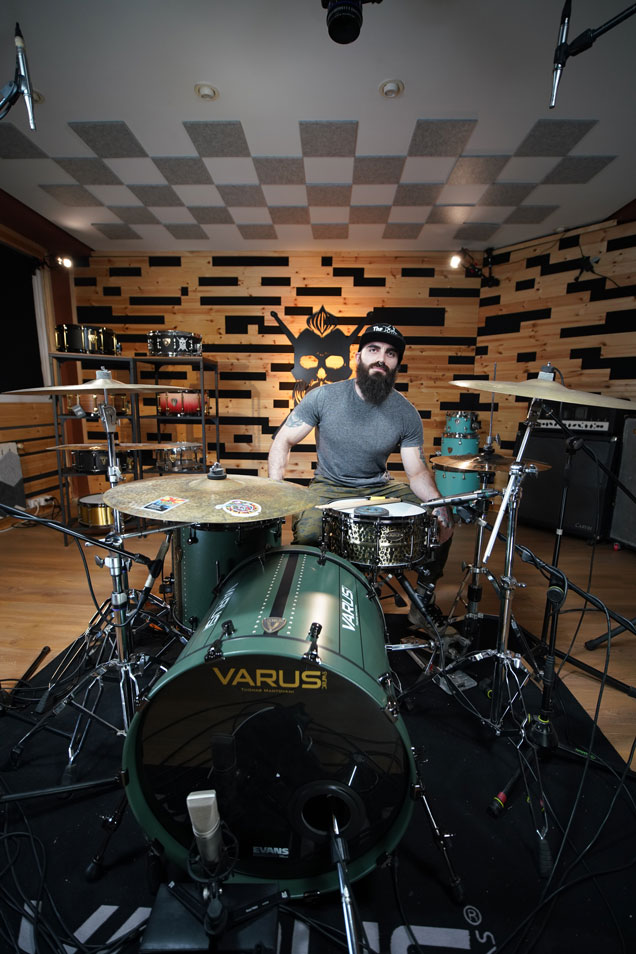
MD: I always tell students that music is one of the only subjects where the end justifies the means. If something sounds good, then it is a good idea. If it sounds bad, then it’s not a good idea. Like you said, it’s pretty simple. If you can be your own best teacher, then what have you learned from yourself?
EE: Trust the process. That works for everything in life, that might disappoint people because it’s about philosophy and life and not about music. People always want to learn the exercise to get faster in five minutes, but the obstacle is usually something personal that you need to understand better about yourself. Maybe you need to change the way you look at the world, if you trust the process and have worked hard on something, don’t judge the things based on the result. Trust that if you keep doing whatever you are doing, as long as you are satisfied with your effort, there will be power and victory in that, and you should be happy. You should be confident that hard work will pay off, and if it doesn’t, at least you tried. A lot of people are scared of trying, and not trying is the biggest failure of all. If you really want to do something, go for it, don’t be afraid to fail. Failing is an opportunity for you to learn; if you fail at least you tried. I know that’s a scary idea, but if I am 80 years old and dying on my deathbed, I don’t want to look back and think, “I should have been a drummer or a painter.” I want to try, and if it happens, that’s a beautiful feeling, but if it doesn’t, that won’t be as bitter as regret.

